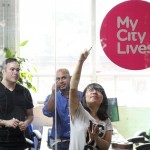 Whilst there have been the occasional foray into the gamification world by local communities and policy makers, it’s perhaps fair to say that the bulk of gamified applications have been in the commercial world.
Whilst there have been the occasional foray into the gamification world by local communities and policy makers, it’s perhaps fair to say that the bulk of gamified applications have been in the commercial world.
That makes a test undertaken by four European cities all the more exciting. The four cities are attempting to use games to encourage physical activity and enhance community safety.
In each city, local residents are encouraged to come together and work on particular problems together. So in Alborg, residents are focusing on how to find people to visit the elderly, whilst in Birmingham they are exploring ways to get women cycling to improve their health.
“In the real world, people often gather in the city square”, says Sobah Petersen from Trondheim in Norway. “We can create a technical platform on the internet which functions as an assembly point. In the same way as on Facebook, people can share their experiences, make plans to meet, and read each other’s news and opinions”, she says.
Each city is using a gamification approach to encourage engagement. Residents can win points every time they use one of the services available on the platform. They might invite a neighbour to join them in an activity by recommending a page or by sharing photos with a group. By awarding points the councils can promote activities they regard as important.
Such crowdsourced engagement is not unusual, with projects such as MyIdealCity in Colombia turning to residents for ideas on how the city could be improved, whilst dozens of civic crowdfunding platforms look to residents for funding civic projects.
My neighbourhood, My city is possibly one of the first to take a gamified approach to things however. The EU backed project will run until 2015, with more information being available at http://my-neighbourhood.eu/
Can any lessons be taken from this approach to civic engagement for improving engagement in the workplace?
Great – all we need now is a standardised issuance protocol for the points or community credits.
Why? Because then you will have a created a brand new investment asset class for socially responsible investors. Forget SIB's and the like, buy the community's currency instead.
Only works though if issuance is regulated and standardised.